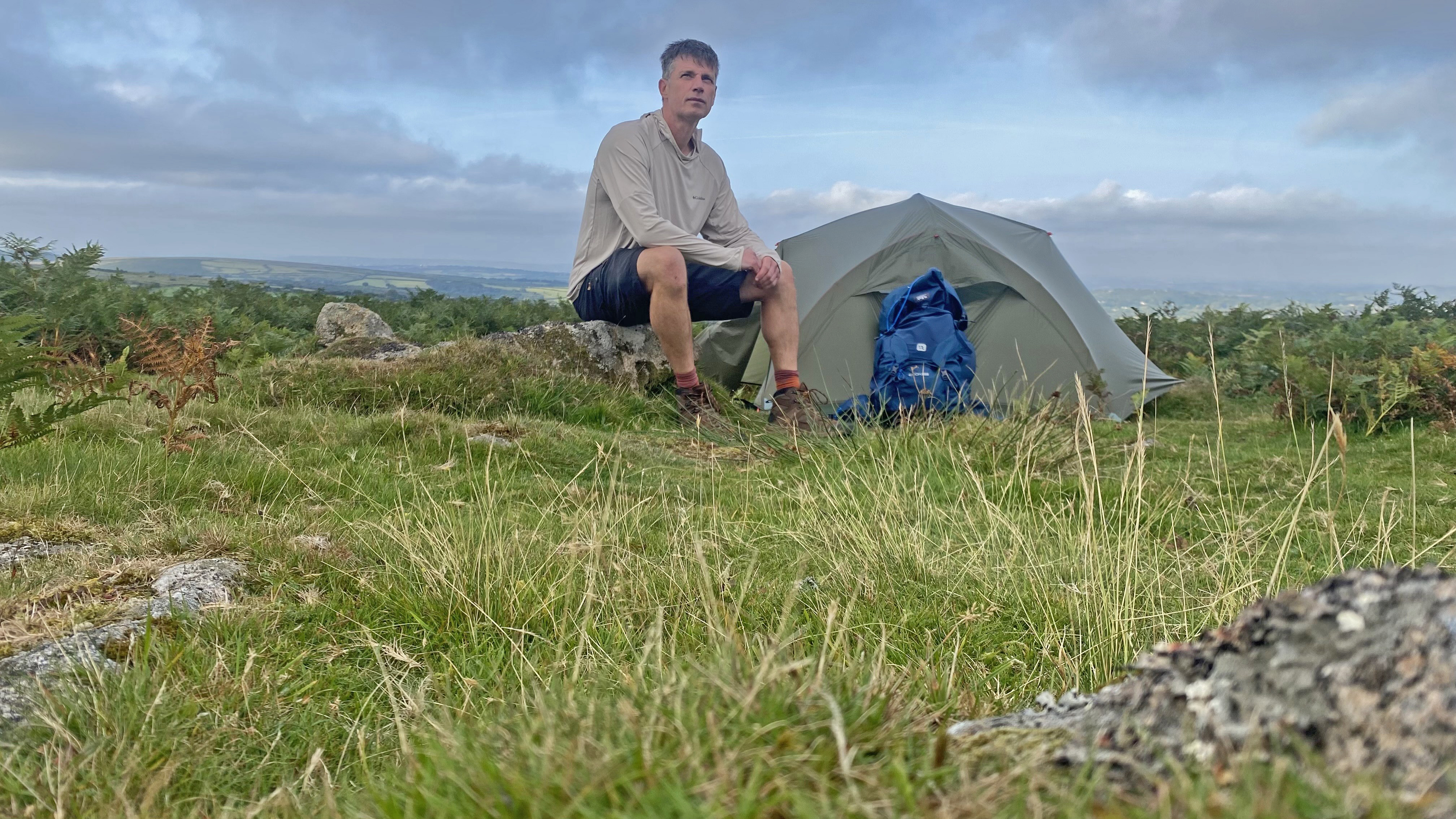Advnture Verdict
This lightweight hooded top, impregnated with long-lasting insect repellent, feels cool next to your skin and works well as a thin outer layer on barmy evenings on the trail, at the crag and in camp, when mosquitoes, midges and sandflies make covering up a necessity. It also offers excellent protection from the sun during exposed summer hikes, and works reasonably well as a baggy base layer for other outdoor adventures.
Pros
- +
Hood protects neck and much of your head & face from bug bites
- +
Comfortable & breezy loose-fit design
- +
Cool next-to-skin feel
- +
Thumb loops
- +
Great sun protection (UPF 50+)
- +
Impregnated with insect repellent
- +
Good stretch allows plenty of freedom of movement
- +
Versatile
Cons
- -
Limited colors
- -
No odor / bacteria control
- -
Little thermal protection
- -
No recycled content (as far as we can see)
You can trust Advnture
First impressions
Cool to touch (and to look at, especially when compared to some of the items in the range), the Skien Valley Hoodie from Columbia is a lightweight, long-sleeved top that can be worn as a base layer beneath a fleece jacket or waterproof shells while hiking, or as a stand-alone top during dry and warm weather, especially when biting bugs are making a nuisance of themselves.
List price: $70 (US) / £65 (UK)
Fabric: Polyester (89%) & Elastane (11%), with Insect Shield
Weight (Men’s Large): 8.9oz / 253g
Models available: Men’s and women’s
Sizes: Men’s: S–XXL / Women's: XS–XXL
Colors: Men’s: City Grey / Dark stone; Women’s: Spray / White / Pink sand
Compatibility: Summer walking, hiking, backpacking, camping and traveling
When I received several items from Columbia’s new Insect Shield collection to test, this was the first garment I reached for when hiking and camping on sweaty summer evenings, because it felt nice, looked decent and seemed like a good first line of defense against the blood-sucking beasts that make a habit of attacking me. Here’s how it performed.
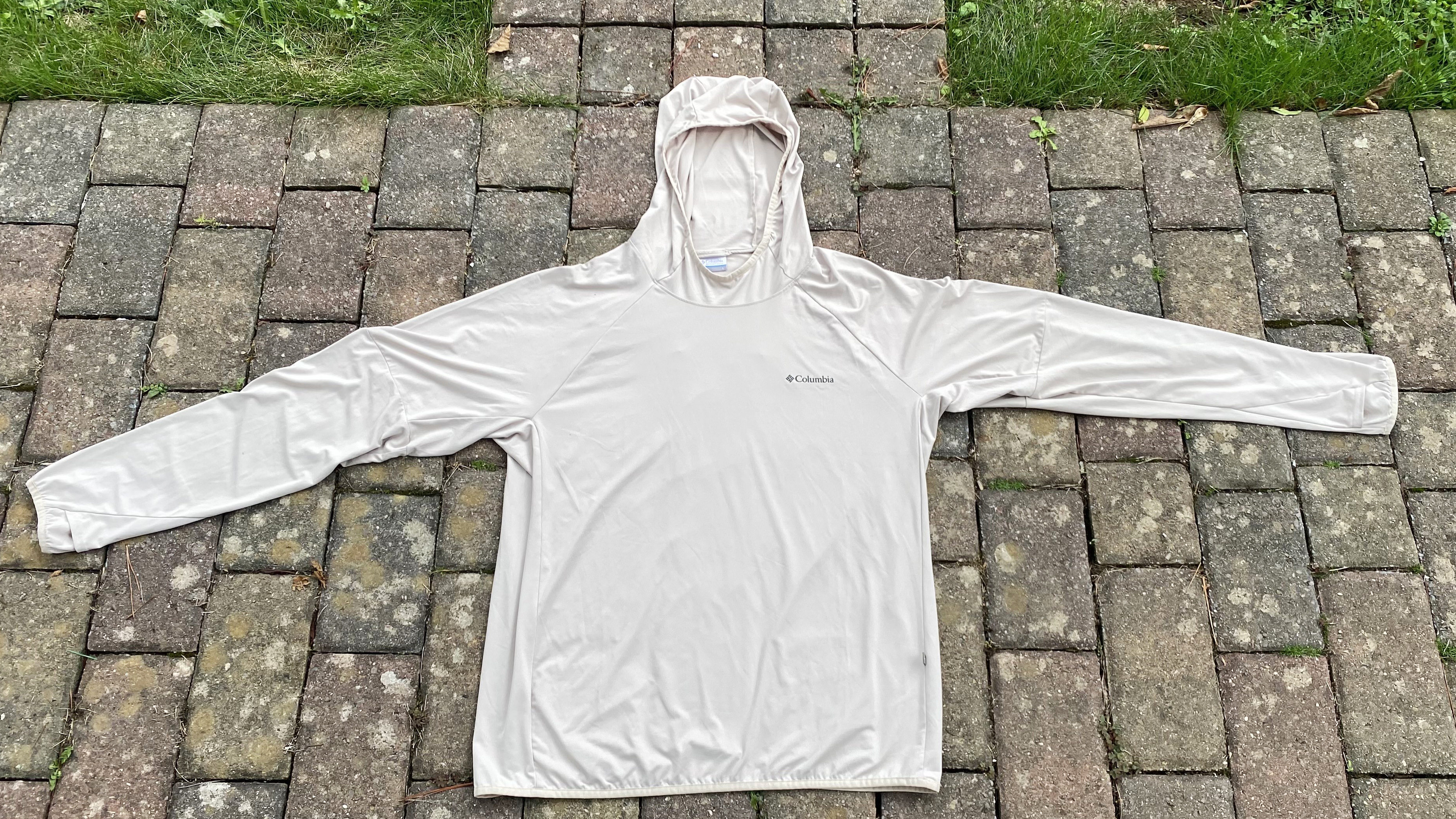
Design and Materials
The Skien Valley hoodie is made with a material mixture of polyester and elastane. Oddly, Columbia don’t specify whether the polyester used in this top is recycled, whereas the same fabric used in other garments in the collection is recycled (in the absence of clear labelling, we’re going to assume that it isn’t recycled in this case). The elastane content in the top makes it nice and stretchy.
Available for both men and women (and also in a ‘Big’ version), this top has a relaxed, baggy look and feel. There are no pockets, but it has a hood, obviously (clue in the name) and substantial thumb hoops to keep the long sleeves in place when you add another layer over the top (and also to help protect wrists from biting bugs).
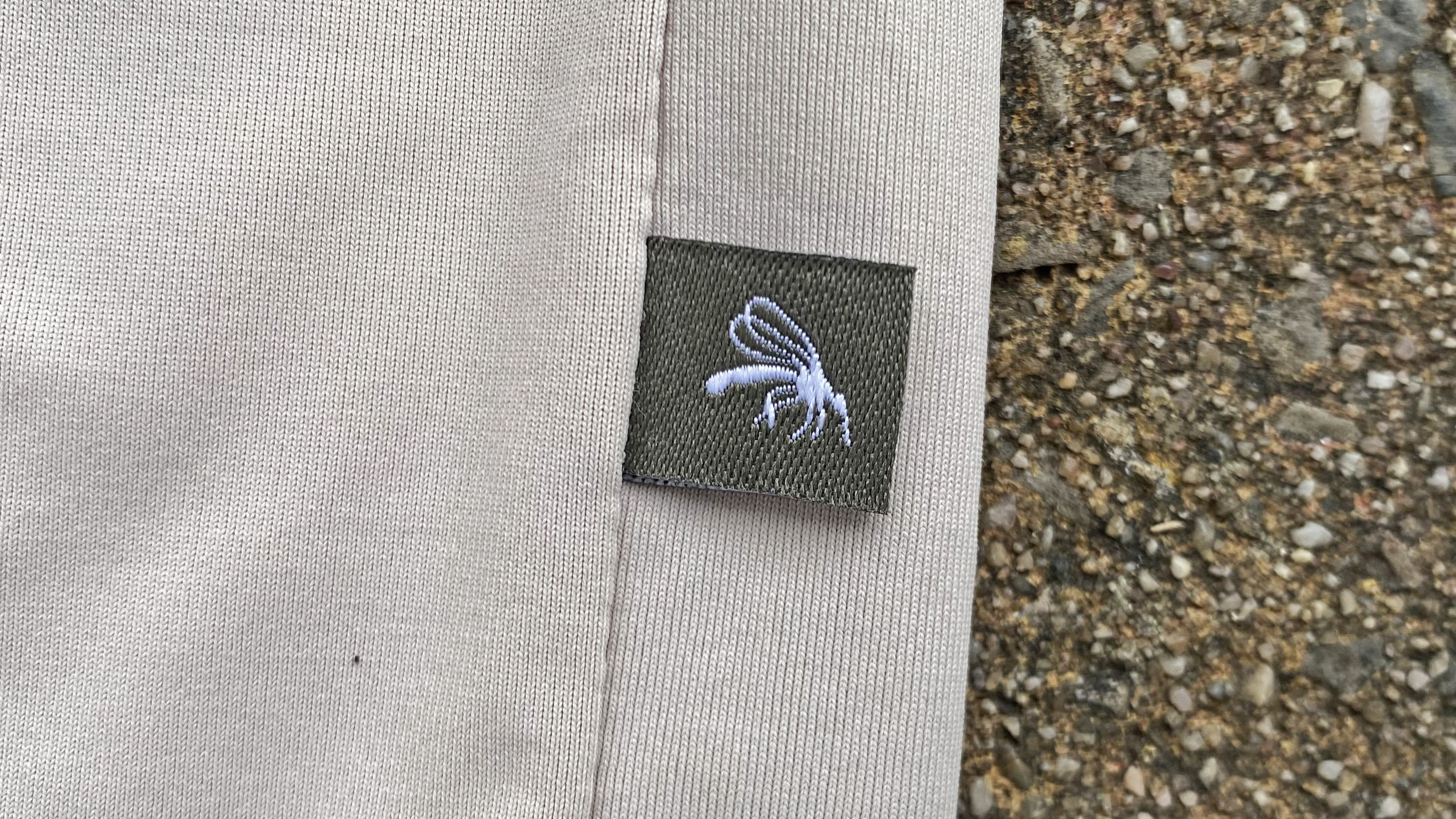
This top is part of Columbia’s new Insect Shield collection of outdoor apparel, all treated with a long-lasting chemical called permethrin, which is capable of deterring, stunning or even killing bugs that come into contact with it. Like the rest of the range, the hoodie is also light colored, because pests like mosquitoes are – apparently – less attracted to more neutral hues.
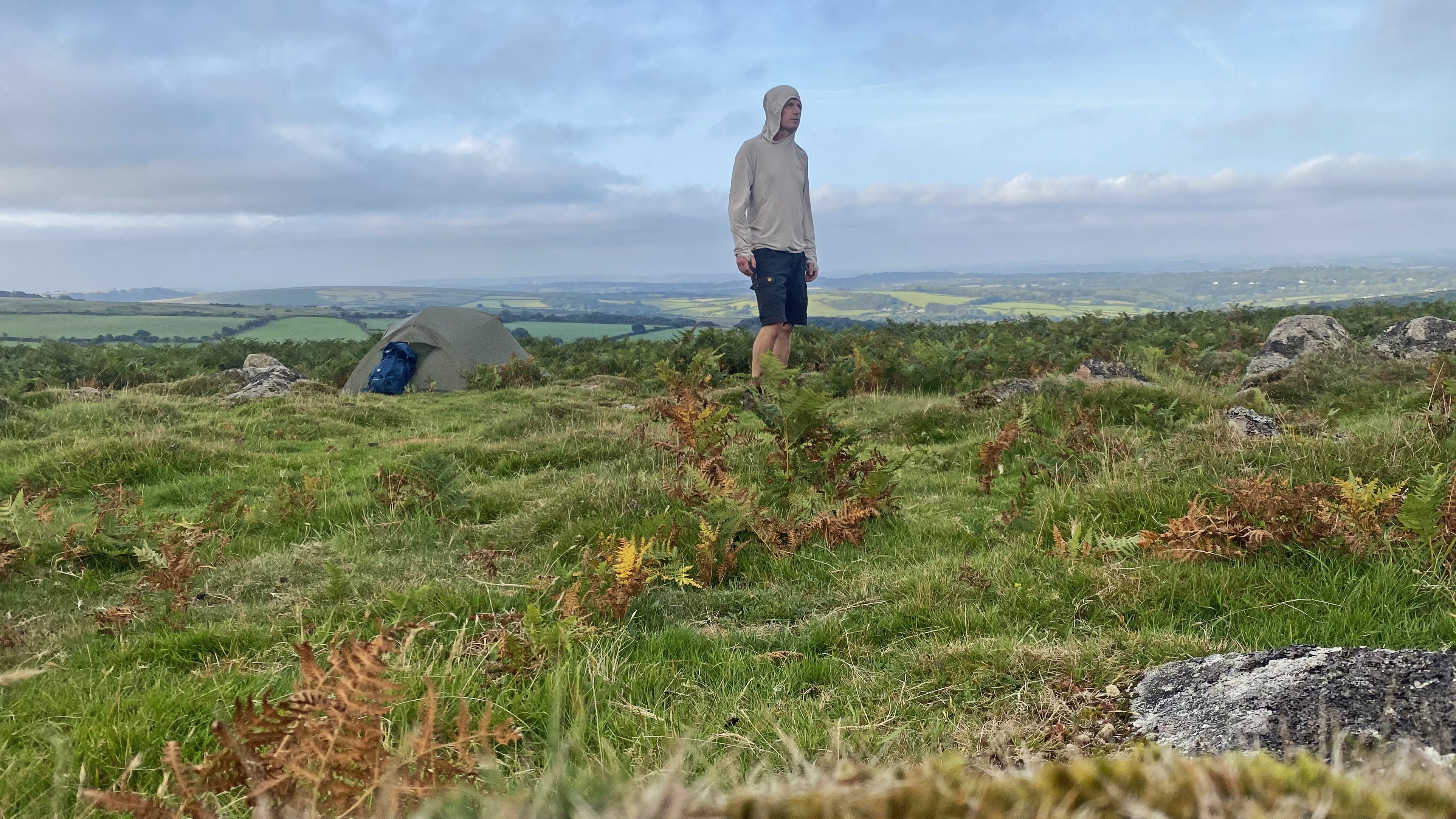
On the trails
I have been testing the Skien Valley hoodie over the scorching summer we have just enjoyed/endured (I liked it, but so did the bugs – so no better time to put this stuff to the test). This season I have mostly been hiking and camping on Dartmoor and in the Wicklow Mountains, both places I’m more accustomed to experiencing in the drizzle, but not in 2025.
We’ve had no less than four heatwaves over the last four months, and the midges (no-see-ums) have been out in force during still evenings on the trail, in camp and around crags. When this happens, you can either cover every inch of yourself in lightweight clothing, from base layers to long socks, or douse yourself in insect repellent – or take a belt and braces approach, and do a mixture of both.
All the latest inspiration, tips and guides to help you plan your next Advnture!
Alternatively, you can clad yourself in clobber from Columbia’s Insect Shield-infused Skien Valley range, which is a bit like doing both. This is the approach I took in the Wicklow Mountains, where the midges were particularly horrendous. More so than the Skien Valley shirt (which I liked, but for other reasons) this hoodie proved to be particularly effective as armor against biting bugs, because it covered my whole top half, including my neck and – thanks to the thumb hoops – protected my wrists (always a target for midges and mosquitoes).
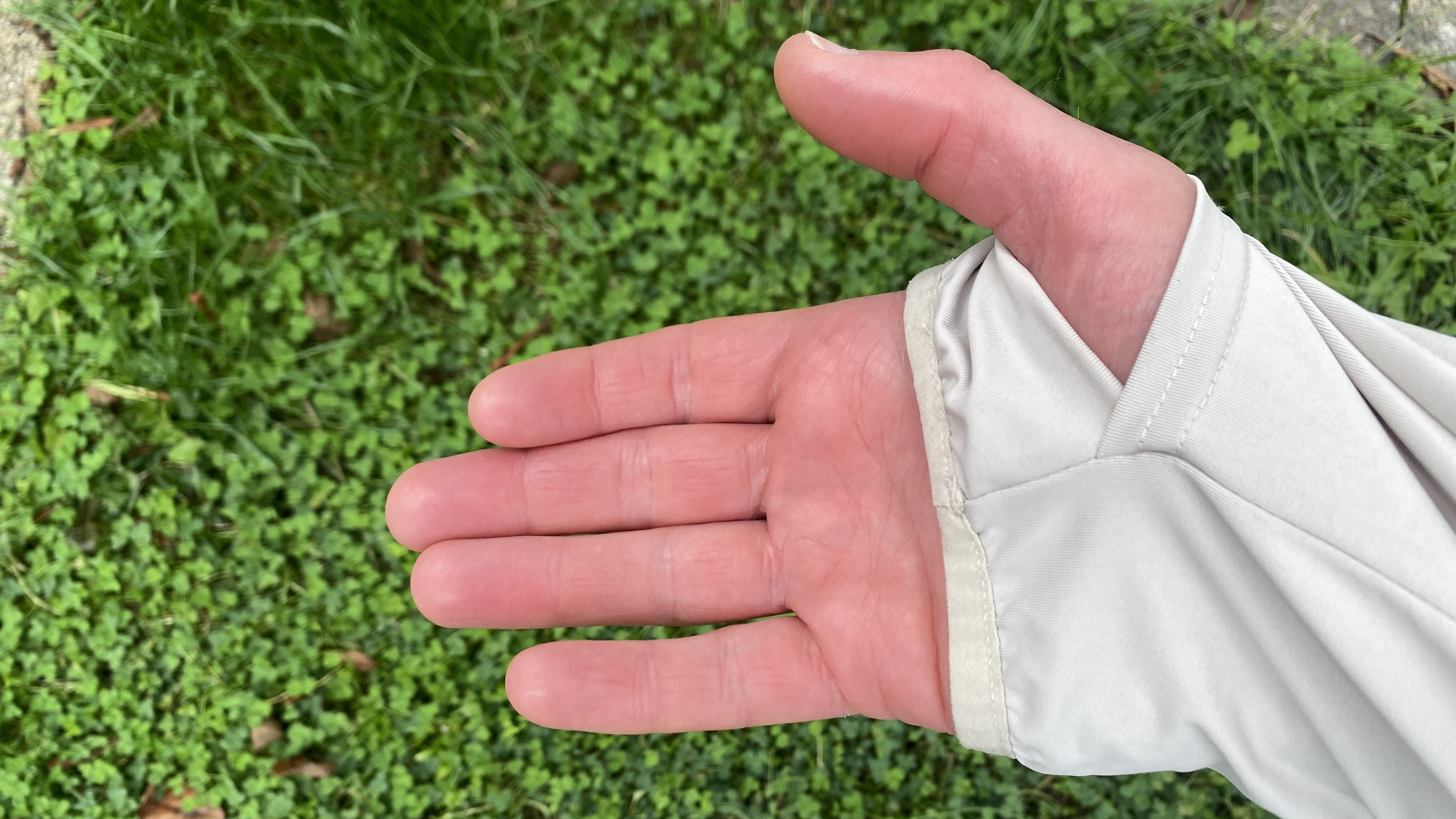
Also, even when paired with the similarly light-colored Skien Valley cargo pants, it looks decent, so when I was hanging out in communal campsites rather than wild camping on my own, I didn’t feel like a complete plum, as I did while wearing the Booney Hat, which is also part of the range.
Obviously it doesn’t protect your face from the irritating little monsters, so when they were at their worst I did often resort to wearing the wide brimmed hat with its full-face net, or when the temperatures cooled a little, pulling on the Skien Valley Hooded Light Jacket, which also features face netting.
During the day, I found the Skien Valley hoodie to be a very comfortable top to hike in, especially on hot days when I was exploring the exposed tor tops and mountain sides, where it provided excellent protection from the sun and the loose-fit style allowed lots of airflow. And, during climbing and scrambling adventures, the top boasts plenty of stretch, so you have a full range of movement and can reach for hand holds.
All-round, it’s a fine, functional piece of kit, and the item I’m likely to get the most use out of from the whole Skien Valley range.

Author of Caving, Canyoning, Coasteering…, a recently released book about all kinds of outdoor adventures around Britain, Pat has spent 20 years pursuing stories involving boots, bikes, boats, beers and bruises. En route he’s canoed Canada’s Yukon River, climbed Mont Blanc and Kilimanjaro, skied and mountain biked through the Norwegian Alps, run an ultra across the roof of Mauritius, and set short-lived records for trail-running Australia’s highest peaks and New Zealand’s Great Walks. He’s authored walking guides to Devon and Dorset, and once wrote a whole book about Toilets for Lonely Planet. Follow Pat’s escapades on Strava here and Instagram here.
